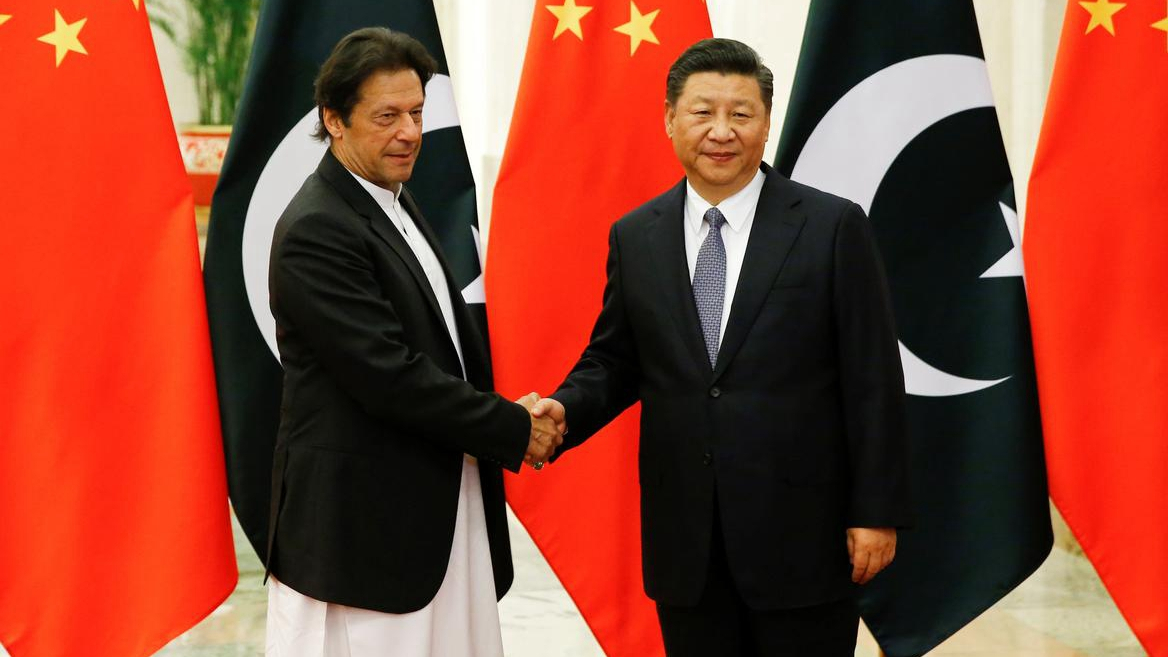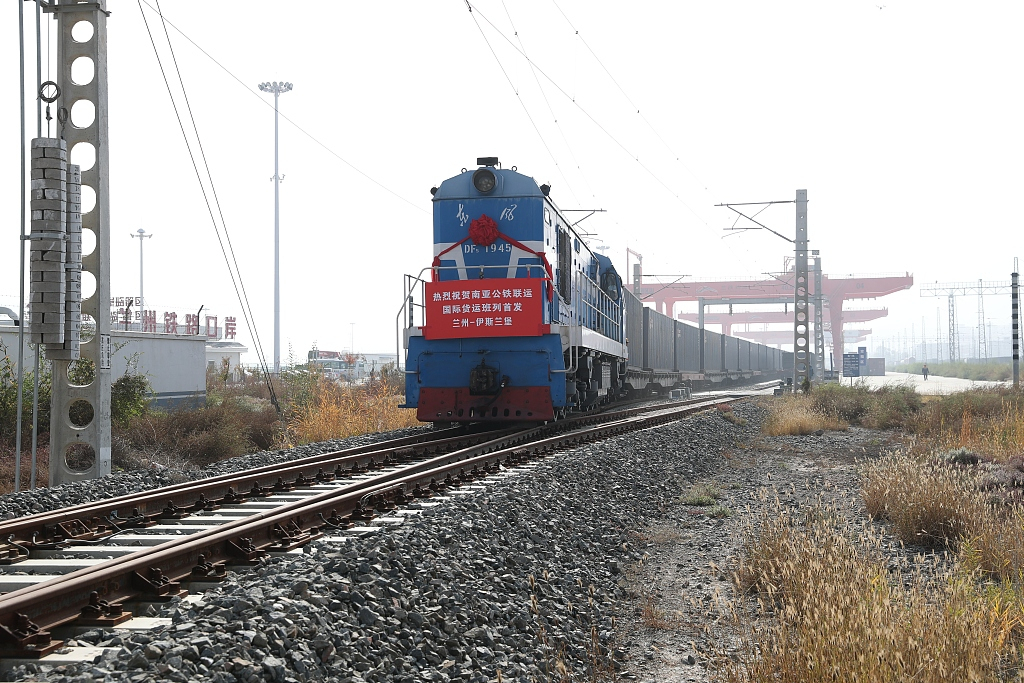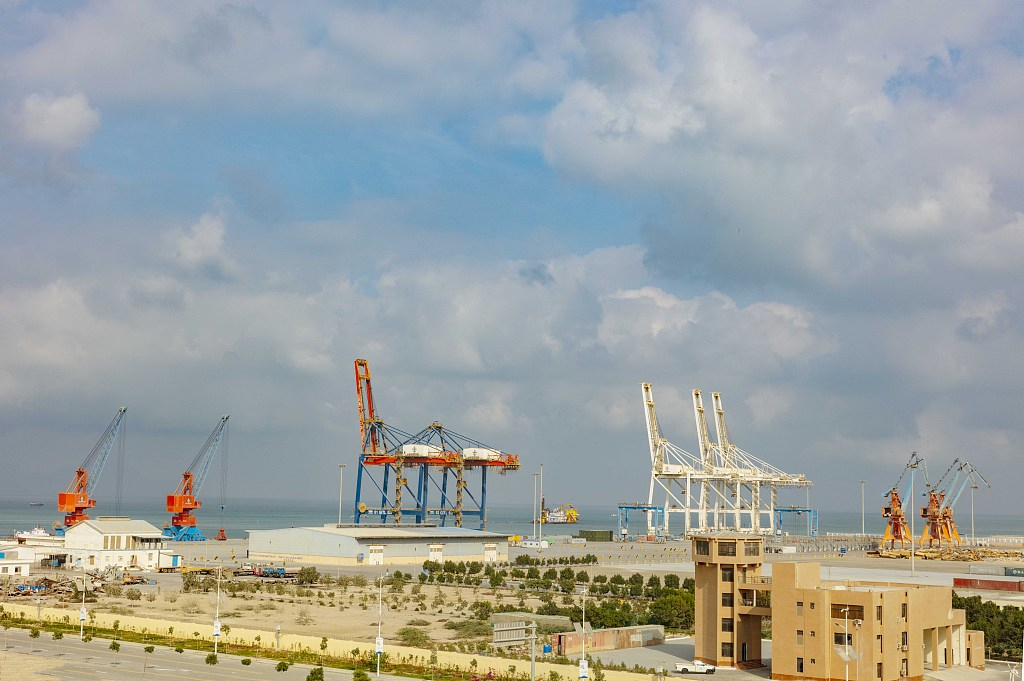
Chinese President Xi Jinping (R) meets Pakistani Prime Minister Imran Khan at the Great Hall of the People in Beijing, November 2, 2018. /Reuters Photo
Chinese President Xi Jinping (R) meets Pakistani Prime Minister Imran Khan at the Great Hall of the People in Beijing, November 2, 2018. /Reuters Photo
Editor's note: Azhar Azam works in a private organization as a market & business analyst and writes about geopolitical issues and regional conflicts. The article reflects the author's opinions, and not necessarily the views of CGTN.
The U.S. is desperately trying to somehow blow up China's economic, political, strategic, trade and technology interests across the world. Internationally, it has reached out to its allies seeking support to impair Chinese regional and global interests.
In pursuit of its maligned campaign against China domestically, Washington has taken several hurtful measures against Beijing such as tariffs on Chinese goods and restrictions on its technology companies and additionally stepped up efforts to blame China by interfering in its internal Hong Kong affairs.
The latest China-targeted move surfaced on November 21 after the U.S. top diplomat for South Asia Alice Wells shockingly warned Pakistan that the China-Pakistan Economic Corridor (CPEC) would push the country into deeper and steeper Chinese debt burden, nurture corruption and transfer jobs and profits to Beijing.
In her "unusually specific" speech, Wells augured that China's CPEC and non-CPEC loans were "going to take a growing toll on the Pakistan economy." And even if the repayments were deferred, they would hang over Pakistan economic development potential and disrupt Prime Minister Imran Khan's reform agenda.
The U.S. knocked the wrong door this time to implement its hate-driven strategy. When it comes to China, Pakistan would be the last country in the world to even thinking about Beijing blowing up its economy through national debt and pinching native employment and revenue.

China launches its first international freight train service between Lanzhou and Islamabad, Pakistan, October 23, 2018. /VCG Photo
China launches its first international freight train service between Lanzhou and Islamabad, Pakistan, October 23, 2018. /VCG Photo
The relationship between China and Pakistan is not just confined to CPEC, which is only a part of a greater Sino-Pakistan cooperation. The two countries are entwined in much wider and more focused areas of social, economic, trade, defense and strategic collaboration.
Besides, Islamabad is largely an import-based economy and since the South Asian country has struggled to increase its exports in the last five years, the ballooning current account and trade deficit have put immense pressure on its foreign exchange reserves' ability to repay foreign debts. CPEC, purely a transportation project, cannot be convoluted with Pakistan's weakened liquidity position.
Out of 22 CPEC-related projects worth of 18.9 billion U.S. dollars at the end of 2018, more than 12 billion U.S. dollars were investments in energy sector to ease its power shortage and only 5.9 billion U.S. dollars were provided to Pakistan by China as loans over a period of five years on concessional rates to improve its infrastructure network. While Pakistan's foreign debt amounted to about 106.9 billion U.S. dollars in September of 2019, the Chinese loans accounted for about 5.5 percent of the country's total external debt.
Wells' claim of CPEC repatriating Pakistani jobs and profits to China is untrue as well. So far, only the CPEC energy projects had generated 250 million U.S. dollars in tax revenues to Pakistan and provided 10,000 jobs to the nationals as well as adding 14.5 percent to the total energy output.
Ambassador Wells also alleged the lack of transparency could inflate costs of CPEC projects and foster corruption. She hypothetically attached transparency of the energy projects with corruption and presented no evidence whatsoever to back her allegations.

Gwadar Port in Pakistan, January 18, 2019. /VCG Photo
Gwadar Port in Pakistan, January 18, 2019. /VCG Photo
As a matter of fact, the U.S. meddled in Pakistani domestic issues and sovereignty by creating doubts on the government's nationwide anti-corruption drive, and deliberately accused Chinese state companies of encouraging "corruption" to give hype to its China-crusade.
Concluding the fifth CPEC media forum, organized jointly by Chinese embassy in Islamabad and Pakistan-China Institute, both sides blasted Wells' remarks urging Islamabad to "ask Beijing tough questions on debt, accountability, fairness and transparency" and unanimously found there was no corruption.
Pakistan is a sovereign country and Wells' comments grossly violated international diplomatic standards and intervened in Pakistani domestic and foreign affairs by seeking Islamabad to question Beijing and politicking the project of economic and strategic significance.
China came to salvage Pakistan's economy and defense after the latter suffered from 150 billion U.S. dollars of economic losses and 70,000 casualties due to U.S. war on terror in Afghanistan.
On top of that, China and Pakistan maintain historical friendly relations and all efforts to spark differences between the two countries have repeatedly failed. So, the U.S. must refrain setting Pakistan's foreign policy objectives and cede trumpeting doubts about fate-changer CPEC project that can promote peace and prosperity of more than 200 million of Pakistanis.
(If you want to contribute and have specific expertise, please contact us at opinions@cgtn.com)